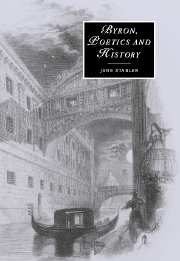Book contents
- Frontmatter
- Contents
- Acknowledgements
- Note on texts
- Abbreviations
- Introduction: Byron and the poetics of digression
- 1 ‘Scorching and drenching’: discourses of digression among Byron's readers
- 2 ‘Breaches in transition’: eighteenth-century digressions and Byron's early verse
- 3 Erring with Pope: Hints from Horace and the trouble with decency
- 4 Uncertain blisses: Don Juan, digressive intertextuality and the risks of reception
- 5 ‘The worst of sinning’: Don Juan, moral England and feminine caprice
- 6 ‘Between carelessness and trouble’: Byron's last digressions
- Notes
- Bibliography
- Index
4 - Uncertain blisses: Don Juan, digressive intertextuality and the risks of reception
Published online by Cambridge University Press: 22 September 2009
- Frontmatter
- Contents
- Acknowledgements
- Note on texts
- Abbreviations
- Introduction: Byron and the poetics of digression
- 1 ‘Scorching and drenching’: discourses of digression among Byron's readers
- 2 ‘Breaches in transition’: eighteenth-century digressions and Byron's early verse
- 3 Erring with Pope: Hints from Horace and the trouble with decency
- 4 Uncertain blisses: Don Juan, digressive intertextuality and the risks of reception
- 5 ‘The worst of sinning’: Don Juan, moral England and feminine caprice
- 6 ‘Between carelessness and trouble’: Byron's last digressions
- Notes
- Bibliography
- Index
Summary
In the last three chapters we have seen how Byron disconcerted his first readers, his friends and his publisher by reconfiguring the rich satiric traditions of Churchill, Prior, Sterne and Pope. Their playfulness beckoned to an adventurous and textually experienced class of readers whose own protean potential mirrored the writers' polarities of scurrility and sublimity. But by the early nineteenth century, public manners were changing. In his early career, Byron's peerage offered the alibi of social class for stylistic misdemeanour, but even before he left England his digressive poetics were beginning to place the relationship between poet and reader in jeopardy.
Byron's susceptibility to awkward particulars was especially troubling to the ‘middling’ readership with its reliance on a conservative, polite concept of the general. The poetics of factual specificity jolted the reader out of neatly consolidated expectations about genre and taste and into sudden encounters with physical minutiae. William Hazlitt described this experience as a form of textual travel sickness the reader shared with the seasick Don Juan, complaining that ‘after the lightning and the hurricane, we are introduced to the interior of the cabin and the contents of wash-hand basins’. Shadowing the ottava rima verse, the Pope/Bowles controversy was also received as a fall from grace.
- Type
- Chapter
- Information
- Byron, Poetics and History , pp. 106 - 135Publisher: Cambridge University PressPrint publication year: 2002



